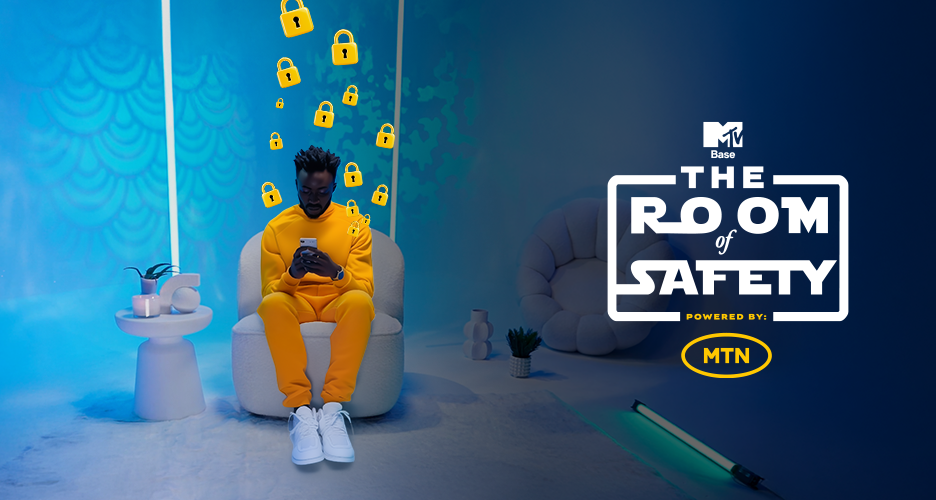
- Home
- About Us
- Sustainability
- Investors
- News
- People & Culture
-
Regions

By Marina Madale, Executive: Sustainability & Shared Value, MTN Group and Monde Twala, Senior Vice President, Paramount Africa
“The digital world is no longer a place young people visit, it’s where they live.” – Marina Madale
“When we use platforms like MTV to spark difficult conversations, we shift from entertainment to real impact.” – Monde Twala
Last week, MTN and MTV Base launched The Room of Safety with the premiere of its first episode, “Why Internet Safety Matters”—a bold and timely response to the evolving risks and responsibilities facing Africa’s youngest digital citizens. With AI companions on the rise and social feeds curating idealised versions of reality, today’s online experiences are more immersive, personal, and emotionally charged than ever before.
While AI, deepfakes, and virtual influencers may sound like Silicon Valley phenomena, their consequences are playing out daily in African households, often on entry-level smartphones with little adult oversight.
The Invisible Friend on the Other Side of the Screen
Across MTN markets, over 70% of internet users are under the age of 30. In MTN-commissioned research with IPSOS across three African countries, 1 in 3 youth reported interacting with an AI companion, chatbot, or virtual assistant, many for emotional connection, curiosity, or entertainment.
“Young people turn to these AI tools in search of support, validation, even companionship,” explains Monde Twala. “But we must ask, are these systems equipped to deal with emotional complexity, or are they simply mimicking empathy to keep users engaged?”
Twala adds that The Room of Safety was intentionally brought to life through MTV Base, one of the continent’s most influential youth platforms: “We wanted to use a trusted cultural voice not just to entertain, but to educate. These conversations can’t live in policy papers, they need to be in playlists, timelines and conversations with real-life resonance.”
Why It Matters Now
In the first episode, young people reflect on the emotional pressure of navigating online life. “Comparison is the thief of joy. It’s a quote I live by,” shares Yanda Woods in the episode, capturing the silent impact that curated perfection can have on young people’s mental health. Foyin Ogunrombi adds, “The difference between real success and the curated version we see on social media is exactly that—social media is heavily curated.”
In a digital landscape where perfection is the norm and imperfections are hidden, many young users are left feeling inadequate, isolated, and increasingly drawn toward online artificial relationships that don’t always serve their emotional needs.
A 2023 UNICEF study on Child Online Protection in Sub-Saharan Africa found that 47% of adolescents in urban centres had encountered harmful or inappropriate content online, often pushed by opaque algorithms designed for engagement, not care.
Critical Thinking Is Now a Survival Skill
“We’re no longer just teaching digital access—we’re teaching digital discernment,” says Marina Madale. “Today’s youth must know how to ask: Who built this? Why is it suggesting this? Is it helping me, or harvesting me?”
She recalls a question raised: “If an AI bot gives you advice that makes you feel worse, is it your fault for listening?” It’s a troubling thought, but one that reflects the confusion many young users face when lines between real and artificial support are blurred.
The Room of Safety encourages not just awareness, but self-inquiry, empowering youth to approach digital platforms with more confidence, agency, and understanding.
One Simple Act That Could Save a Life
One of the most powerful takeaways from Episode 1 is the reminder that you are enough, even without the filter. In a world that constantly measures worth through likes, follows, and curated perfection, the ability to believe in yourself, without needing external validation, is a radical act of self-preservation.
TheRoom of Safety encourages young people to turn inward for affirmation and to trust their instincts, rather than relying on AI companions or online approval to feel seen. Building self-worth from within is not easy, but it is essential, and often begins with honest conversations, not with machines, but with real people: a teacher, a caregiver, a sibling, a friend.
To support this, MTN’s campaign includes direct links to mental health services, child protection resources, and regional helplines across its markets. These are not just add-ons, they are lifelines.
A New Digital Mandate for Africa
With the youngest and fastest-growing online population in the world, Africa faces a pivotal moment. The task ahead is not just to connect, but to protect. The Room of Safety is a rallying cry, not to fear technology, but to shape it with intention and empathy.
“When platforms like MTV are used to spark difficult conversations, we move from passive awareness to real impact,” says Monde Twala. “This campaign is about creating spaces that are not only engaging, but safe and transformative.”
Marina Madale concludes, “The same technology that threatens can also be used to empower, if we give our children the tools to engage with it wisely. The Room of Safety is just the beginning of that journey.”
The next episode will explore cyberbullying, where to draw the line between banter and harm, and how to speak up when it matters most.
Until then, we are left with a question:
If a young person is turning to a chatbot to feel seen, will the digital world they find be a bridge, or a blindfold?
The answer may shape the next generation of Africa’s digital future.